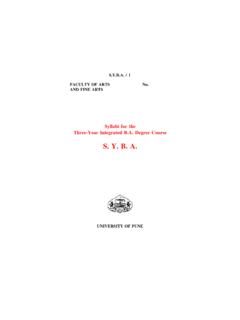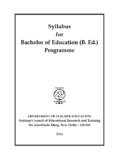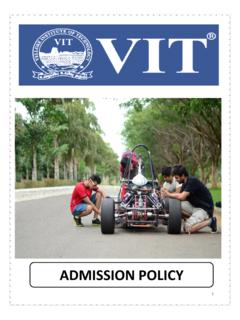Transcription of SYLLABUS FOR TWO-YEAR Bachelor of Education B.Ed …
1 SYLLABUS FOR TWO-YEAR . Bachelor of Education COURSE. As per Regulation 2014. VINOBA BHAVE UNIVERSITY. HAZARIBAG. Dr. Md. Tanwir Yunus Prof. (Dr.) Raj Kumar Nayak Prof. Vinoti Trivedi Reader, University Deptt. of Education Principal Joint Co-ordinator, Deptt. of Education VBU, Hazaribag College, Bokaro College, Dhanbad DEPARTMENT OF Education . VINOBA BHAVE UNIVERSITY, HAZARIBAG. STRUCTURE OF THE TWO year PROGRAMME-SEMESTER WISE DISTRIBUTION OF THE COURSES. SEMESTER 1. SL. Courses Names of the courses Course code Instructional Credit Tutorial Maximum marks TOTAL. NO. hours hours THEORY Internal External COURSES Term-End Examination 1. 1 Childhood and growing up TC-101 06 06 02 20 80 100. 2. 2 Contemporary India and TC-102 06 06 02 20 80 100.
2 Education 3. 3 Language across the TC-103 03 03 01 10 40 50. curriculum(1/2). 4. 4 Understanding Discipline and TC-104 03 03 01 10 40 50. subjects(1/2). PRACTICUM. 5. EPC 1 EPC 1 Reading and Reflecting on P-105 03 03 01 50 50. Texts(1/2). TOTAL 21 21 07 110 240 350. NOTE- EPC-ENHANCING PROFESSIONAL CAPACITIES. DEPARTMENT OF Education . VINOBA BHAVE UNIVERSITY, HAZARIBAG. STRUCTURE OF THE TWO year PROGRAMME-SEMESTER WISE DISTRIBUTION OF THE COURSES. SEMESTER 2. SL. Courses Names of the courses Course code Instructional Credit Tutorial Maximum marks TOTAL. NO. hours hours THEORY Internal External COURSES Term-End Examination 6. 5 Learning and Teaching TC-201 06 06 02 20 80 100. 7. 6 Knowledge and Curriculum-part TC-202 03 03 01 10 40 50.
3 1(1/2). 8. 7 Pedagogy of a school subject- TC-203 03 03 01 10 40 50. part1(1/2). 9. 8 Assessment for Learning TC-204 06 06 02 20 80 100. PRACTICUM. 10. EPC 2 Drama and Art in Education (1/2) P-205 03 03 01 50 50. TOTAL 21 21 07 110 240 350. NOTE-PEDAGOGY OF A SCHOOL SUBJECT PART 1(1/2) TC 203. Language-English TC 203-1, Hindi TC 203-2, Urdu TC 203-3, Sanskrit TC 203-4, Bangla TC 203-5, Social studies- Social Science TC 203-6, History TC 203-7, Civics TC 203-8, Geography TC 203-9, Economics TC 203-10, Commerce TC 203-11, TC 203-12, Science-Physical science B. Ed. TC 203-13, Biological Science B. Ed. TC 203-14, DEPARTMENT OF Education . VINOBA BHAVE UNIVERSITY, HAZARIBAG. STRUCTURE OF THE TWO year PROGRAMME-SEMESTER WISE DISTRIBUTION OF THE COURSES.
4 SEMESTER 3. SL. Courses Names of the courses Course code Instructional Credit Tutorial Maximum marks TOTAL. NO. hours hours THEORY Internal External COURSES Term-End Examination 11. 9 Pedagogy of s school subjects- TC 301 03 03 01 10 40 50. part II(1/2). PRACTICUM. School Internship Report P 302 18 18 10 150 150. Assessment of Practice P 303 100 100. Teaching in selected subject TOTAL 21 21 11 160 140 300. NOTE-PEDAGOGY OF A SCHOOL SUBJECT PART 1(1/2) TC 301. Language-English TC 301-1, Hindi TC 301-2, Urdu TC 301-3, Sanskrit TC 301-4, Bangla TC 301-5, Social studies- Social Science TC 301-6, History TC 301-7, Civics TC 301-8, Geography TC 301-9, Economics TC 301-10, Commerce TC 301-11, TC 301-12, Science-Physical science B. Ed.
5 TC 301-13, Biological Science B. Ed. TC 301-14, SEMESTER 4. SL. Courses Names of the courses Course code Instructional Credit Tutorial Maximum marks TOTAL. NO. hours hours THEORY Internal External COURSES Term-End Examination 12. 10 Gender, School and society(1/2) TC-401 03 03 01 10 40 50. 11 Knowledge and Curriculum part TC-402 03 03 01 10 40 50. II (1/2). 12 Creating an Inclusive school(1/2) TC-403 03 03 01 10 40 50. 13 Optional courses a)Vocational/work Education TC-404a 03 03 01 10 40 50. b) Health and Physical TC-404b Education c)Peace Education TC-404c d)Guidance and Counseling TC-404d e)Issues of Conservation and Environmental Regeneration TC-404e f)Yoga Education TC-404f g) Value Education and Human TC-404g Rights PRACTICUM.
6 EPC 3 Critical understanding of ICT P-405 03 03 01 50 50. EPC4 Understanding the self P-406 03 03 01 50 50. TOTAL 18 18 06 140 160 300. CURRICULAR AREAS. The programme shall comprise three broad curricular areas Perspectives in Education , Curriculum and Pedagogic Studies, and Engagement with the Field. The courses under each of these areas are as follows: A. THEORY COURSES. I. Perspectives in Education Course 1 Childhood and Growing Up Course 2 Contemporary India and Education Course 5 Learning and Teaching Course 6 Knowledge and Curriculum part I. Course 10 Gender, School and Society (1/2). Course 11 Knowdge & Curriculum Part - II. Course 12 Creating an Inclusive School (1/2). II. Curriculum and Pedagogic Studies Course 3 Language across the Curriculum (1/2).
7 Course 4 Understanding Disciplines and Subjects (1/2). Course 7 & 9 Pedagogy of a School Subject Course 8 Assessment for Learning Course 13 Optional Course*(1/2). B. ENGAGEMENT WITH FIELD/ PRACTICUM. III. Engagement with the Field the Self, the Child, Community and School This curricular area would have three components . Tasks and Assignments that run through all the courses as indicated in the year wise distribution of the SYLLABUS School Internship Courses on Enhancing Professional Capacities (EPC). Course EPC 1: Reading and Reflecting on Texts (1/2) Course EPC 2:Drama and Art in Education (1/2). Course EPC 3: Critical Understanding of ICT (1/2) Course EPC 4: Understanding the Self (1/2). Internal Assessment External Assessment Semester - 1 110 240.
8 Semester 2 110 240. Semester 3 160 140. Semester - 4 140 160. TOTAL 520 780. Theory Course Instruction Hours Credit hours Tutorial Marks Perspective in Education 30 30 7 680. Curriculum and Pedagogy Course 21 21. PRACTICUM 30 30 24 620. TOTAL 81 81 31 1300. Note: . 1/2 indicates a half paper which is allocated both half the time of effective hours per week and also half the marks assigned to a full paper. The design of the programme would enable students to specialize in one subject area, at one/ two levels of school. Optional courses will be offered in areas such as Vocational/Work Education , Health and Physical Education , Peace Education , Guidance and Counselling, or an additional pedagogy course (in another subject at the secondary level or the same subject at the higher secondary level).
9 Graduate Students from Arts faculty may choose Social science as their specialization it is not offered to post graduate students, they are suppose to choose the subject of their master degree . Page |1. SYLLABUS FOR TWO-YEAR . Bachelor of Education COURSE. As per Regulation 2014. VINOBA BHAVE UNIVERSITY. HAZARIBAG. Dr. Md. Tanwir Yunus Prof. (Dr.) Raj Kumar Nayak Prof. Vinoti Trivedi Reader Principal Joint Co-ordinator University Deptt. of Education College Deptt. of Education VBU, Hazaribag Bokaro College, Dhanbad Page |2. NOTE FOR PAPER SETTER. Time : 3hours Maximum marks :80. Types of questions 1. Objective type question 10 Questions x 2 marks = 20. 2. Short answer type 5 Questions x 4 marks = 20. 3. Essay type answer 4 Questions x 10 marks = 40.
10 Total = 80. Time : 1and1/2hours Maximum marks :40. Types of questions 4. Objective type question 5 Questions x 2 marks = 10. 1. Short answer type 2 Questions x 5 marks = 10. 2. Essay type answer 2 Questions x 10 marks = 20. Total =40. Page |3. SEMESTER 1. Page |4. CHILD HOOD AND GROWING UP. Total Marks 100 contact hours per week-6. Internal assessment 20. External assessment 80. Aims of the Course After completion of course the students will be able to to s tudy childhood, child development and adolescence to develop understanding about children of different age groups, through close observation and interaction with children from diverse socioeconomic and cultural backgrounds to enable student teachers to arrive at an understanding of how differentsocio- political realities construct different childhoods, within children's lived contexts: Family, schools, neighbourhoods and community.




